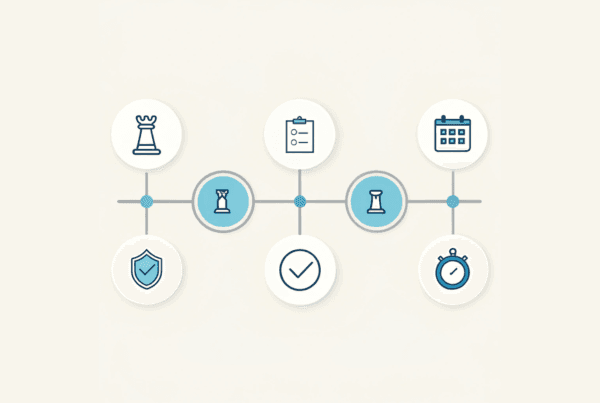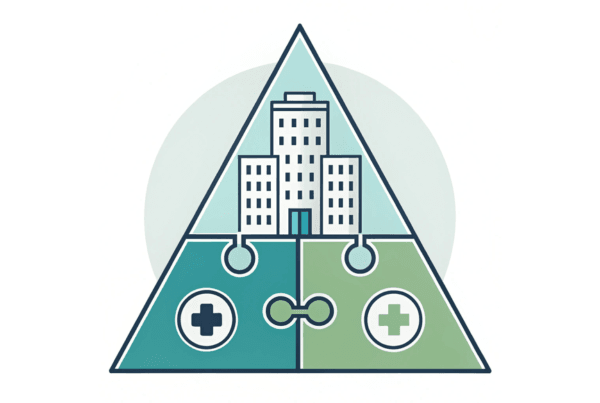
For physician-owners considering a sale, deciding between private equity and a hospital system is more than a financial choice; it’s a decision that will define your practice’s legacy, your professional autonomy, and the future of your patient care. This guide provides a clear, data-driven comparison to help you understand these two very different paths.When you begin exploring an exit, you are weighing two fundamentally different types of partners. This is a key decision point for any owner, as we discuss in our complete Guide to Private Equity in Healthcare. Understanding their goals, structures, and operational styles is the first step toward making the right choice for you, your staff, and your patients.
The Core Difference: Investment Philosophy and Goals
The most significant distinction between a private equity firm and a hospital system is their core reason for acquiring your practice. Every other difference flows from this.
Private Equity’s Goal: Financial Return
A PE firm is an investment vehicle. Its primary objective is to acquire a practice, increase its value through operational efficiencies and growth, and sell it for a significant profit, typically within a 3-to-7-year window. They see your practice as a “platform” for growth, often using a roll-up strategy to acquire other local practices and build a larger, more valuable entity. Their loyalty is to their investors, and success is measured by the return on investment (ROI).
Hospital’s Goal: Strategic Expansion
A hospital or health system acquires a practice to achieve strategic goals. These often include expanding their geographic footprint, securing a stable referral stream for their specialists and facilities, and strengthening their negotiating power with insurance payers. Their timeline is much longer, and success is measured by market share, service line integration, and fulfilling their mission of community care.
Financial Structures and Your Take-Home Value
How you get paid reveals a great deal about your future role and potential.
Private Equity: Cash Plus Rollover Equity
A PE transaction typically involves receiving a significant amount of cash at closing, while also “rolling over” a portion of your ownership into the new, larger company. This rollover equity, usually 10-30% of the deal value, gives you a “second bite of the apple.” If the PE firm successfully grows the business and sells it again, your retained stake could be worth substantially more. This structure keeps you invested—and motivated—as a business partner. For a deeper look, see our guide on PE Deal Structures.
Hospital System: Asset Sale and Employment
A hospital acquisition is usually structured as an asset sale. The hospital buys your practice’s tangible and intangible assets, and you transition from an owner to an employee. Your compensation is defined in a physician employment contract, which typically includes a guaranteed base salary, productivity bonuses, and benefits. This path offers financial stability and predictability but generally caps your long-term financial upside.
| Feature | Private Equity Acquisition | Hospital Acquisition |
|---|---|---|
| Payment Model | Cash at close plus rollover equity stake. | Primarily cash at close. |
| Future Upside | High potential via “second bite of the apple.” | Limited to salary increases and performance bonuses. |
| Post-Sale Role | Partner/Owner with continued financial risk and reward. | Employee with a defined salary and responsibilities. |
| Risk Profile | Higher risk, higher potential reward. | Lower risk, lower potential reward. |
A Tale of Two Futures: Clinical Autonomy and Operations
For many physicians, the fear of losing control over clinical decisions is a primary concern. The reality of post-sale life differs greatly between buyer types.
With a PE partner, business operations will be professionalized, often through a Management Services Organization or MSO structure. You can expect new systems for billing, scheduling, and financial reporting. However, PE firms generally want to keep their physicians happy and productive, so they often protect clinical autonomy. You will likely continue to make the final call on patient care, but you will be expected to meet performance metrics. You can learn more about Maintaining Clinical Autonomy Post-Sale in our detailed guide.
In a hospital system, you become part of a large bureaucracy. Integration often means adopting the hospital’s electronic medical record (EMR), patient protocols, and referral networks. This can provide access to incredible resources but may also lead to a significant loss of independence in both clinical and operational matters. Navigating these Technology & EMR Integration Challenges is a common hurdle.
The Impact on Patients and Staff
The choice of buyer will have a direct impact on the two groups you care about most: your patients and your staff.
Research shows a clear trend after a practice is acquired by private equity. The focus on efficiency can lead to leaner staffing models and increased productivity demands. Some studies indicate this pressure may negatively affect the patient experience. One analysis found that three years post-acquisition, patient satisfaction scores at PE-owned hospitals declined, with patients becoming 2.1% less likely to recommend the facility compared to non-PE hospitals.
A hospital acquisition offers a different set of trade-offs. Your staff may gain better benefits and job security by joining a large organization, but they also risk being absorbed into a less personal corporate culture. For patients, care can become more streamlined through better integration with other specialists, but it can also become more impersonal, with longer wait times and more administrative hurdles.
Quick-Look: PE vs. Hospital Acquisition
| Feature/Impact | Private Equity (PE) Acquisition | Hospital Acquisition |
|---|---|---|
| Primary Objective | Maximize financial returns (3–7 years). | Expand market reach, enhance integrated care. |
| Operational Model | Aggressive efficiency focus, practice consolidation. | Integration into hospital systems and protocols. |
| Physician Autonomy | Clinical autonomy often preserved; business autonomy reduced. | Frequently diminished across the board. |
| Patient Care Impact | Evidence of potential decline in satisfaction. | Varies; can improve with resources or suffer from bureaucracy. |
| Staffing Impact | Leaner staffing, increased productivity goals. | Staff may be retained or reallocated, offering stability. |
Making the Right Choice for Your Practice
There is no single “best” path. The right decision depends entirely on your personal, financial, and professional goals.
A PE partnership may be the right choice if:
* Your primary goal is to maximize the financial value of your practice.
* You have a high tolerance for risk and want to share in the future upside.
* You are energized by the idea of growing the business and are comfortable with a faster, more metrics-driven pace.
A hospital acquisition could be a better fit if:
* You prioritize financial security and a predictable income.
* You are ready to shed administrative and management responsibilities.
* Your goal is to ensure your practice remains a cornerstone of the local healthcare community for the long term.
Navigating this decision requires a clear-eyed assessment of your own priorities. At SovDoc, our Healthcare Strategic Planning services are designed to help you define what success looks like for you. From there, we provide expert Deal Negotiation and Closing Support to ensure the final transaction aligns perfectly with those goals.
Ultimately, whether you partner with a PE firm or join a hospital system, you are making a transformative choice. By understanding their fundamental differences, you empower yourself to select the partner that best honors your life’s work and meets your vision for the future.
Frequently Asked Questions
What are the main differences between selling a medical practice to a private equity firm versus a hospital?
Private equity (PE) firms acquire practices mainly for financial returns within a 3-7 year timeframe, focusing on growth, efficiency, and a roll-up strategy. Hospitals acquire practices for strategic expansion to increase market reach and integrate care, prioritizing long-term community care and stability.
How do the financial outcomes differ when selling to private equity compared to a hospital?
Selling to PE typically involves cash at close plus rollover equity, offering potential for future financial upside if the PE firm successfully grows and resells the practice. Hospital acquisitions usually result in an asset sale followed by employment with a guaranteed salary and bonuses, providing stability but limited long-term financial upside.
Will I maintain clinical autonomy if my practice is acquired by private equity or a hospital?
With PE, clinical autonomy is often preserved, though business operations become more professionalized with performance metrics. Hospitals tend to integrate practices into larger bureaucracies, often leading to reduced clinical autonomy due to adoption of hospital protocols, EMRs, and referral systems.
How will selling to PE versus a hospital affect my staff and patients?
PE ownership often leads to leaner staffing and increased efficiency demands, which some studies link to decreased patient satisfaction. Hospital acquisitions may offer staff greater stability and resources but can also result in integration challenges and more bureaucracy, impacting patient experience variably.
Which selling option might be better for my long-term goals and professional legacy?
Choose PE if you aim to maximize financial returns, accept higher risk, and want a growth-driven, metrics-focused business environment. Choose a hospital if you prefer income stability, wish to reduce administrative burdens, and want your practice to remain a long-term community healthcare provider. Expert planning and negotiation support can help clarify the best choice for your specific goals.



